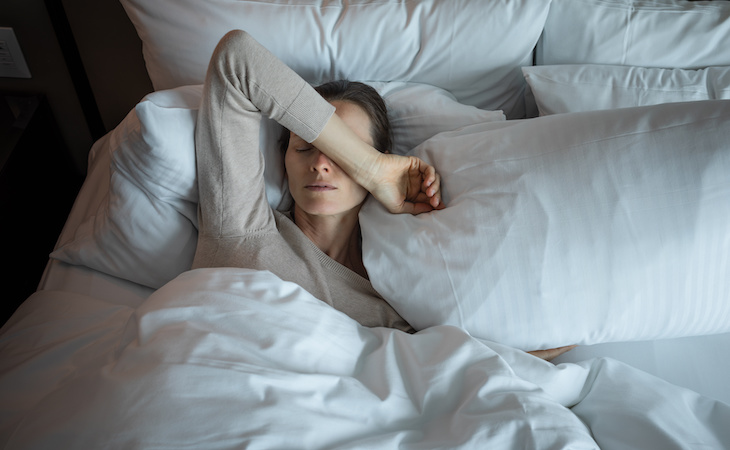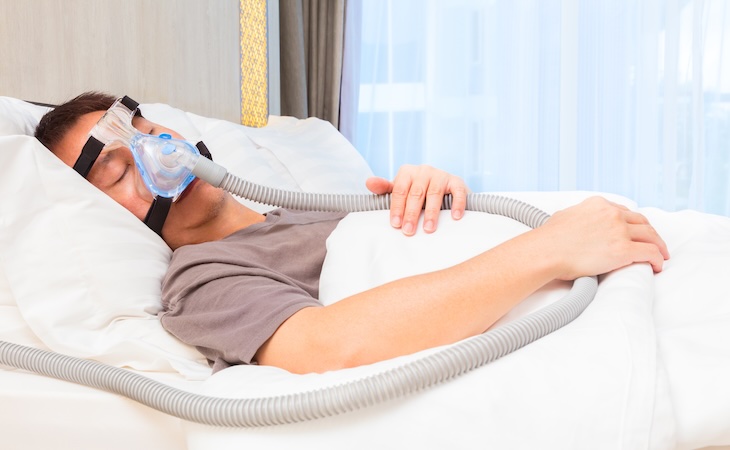Sawing logs. Calling the hogs. Rattling the shingles. There are so many euphemisms for snoring because, well, so many people snore. According to the National Sleep Foundation, an estimated 90 million American adults snore sometimes, and 37 million snore on a regular basis.
While snoring may be the cause of many a midnight jab or exasperated pillow whack from your partner, it’s no laughing matter. Regular snoring can have serious health consequences, both for the snorer and their bed partner. Here, we look into what causes snoring, how to limit your own snoring, and how to sleep better if you share a bed with someone who breathes like a foghorn.
What causes snoring?
While it may sound like snoring is coming from the nose, in actuality, the mechanics of the snore happen in the throat, explains Susheel Patil, MD, PhD, an assistant professor and clinical director of the Johns Hopkins Sleep Medicine Program. “Snoring is caused by a narrowing of the airway passage of the throat while we’re sleeping,” he says. “If the airway becomes too small, it begins to vibrate and we hear that in the form of snoring.” The narrower the airway gets, the greater the vibration and the louder the snoring.
Is snoring dangerous?
In general, no. Simple snoring by itself isn’t dangerous—unless you count those jabs in your ribs by your bed partner. But snoring can be a sign of a more serious sleep condition known as sleep apnea, Patil says. If the throat narrows so much that it cuts off the airway and stops or partially stops your breathing, it is considered sleep apnea. According to the American Sleep Apnea Association, an estimated 22 million Americans suffer from some form of sleep apnea—a serious sleep disorder that should be checked out by a health professional.
While snoring doesn’t lead to sleep apnea, Patil explains, if you suffer from sleep apnea, you also probably snore. “Don’t always assume your snoring is simple snoring,” says Patil. “Talk to your bed partner and see if they observe any other signs that might be more concerning like choking, gasping, or breathing pauses, or if you have other symptoms such as sleep disruptions, daytime sleepiness, or un-refreshing sleep. These could be a sign that you have more than just a snoring problem and should talk to your doctor.”
You’re more likely to snore if…
The two biggest risk factors for snoring? Obesity and being male, says Patil. “The heavier we are, the more likely we’re going to snore,” he says. People who are overweight, obese, or pregnant will often have bulkier throat tissue. The larger and heavier the neck, the more potential pressure on the airway during sleep.
Men are more likely to snore than women. According to the American Academy of Sleep Medicine, about 40% of all adult men regularly snore while only 24% of adult women do. Chalk it up to physical difference: According to the National Sleep Foundation, men naturally have narrower air passages than women.
Snoring can also occasionally be caused by or exacerbated by things that relax and narrow the muscles in your throat such as alcohol, opioid-based pain medications, and some anxiety medications. “These can not only have a relaxing effect on the throat muscles but also impact the brain’s ability to sense that the person is breathing shallowly and make a correction,” says Patil.
Asthma, smoking, nasal congestion from a cold or allergies, or genetic factors that cause enlarged tonsils or a deviated nasal septum can also lead to nighttime log sawing.
How to stop snoring
If you’re the snorer (and know that you don’t suffer from sleep apnea), the goal of eliminating snoring may be to help your relationship. “While we haven’t found health consequences from simple snoring, treating snoring is often about a quality of life issue for your bed partner,” explains Patil. Studies have found that regular sleep disruptions can have substantial short- and long-term consequences for the non-snorer, including emotional distress, mood disorders, cognitive and memory deficiencies, and more serious issues such as hypertension, cardiovascular disease, weight-related issues, and type 2 diabetes.
Before you head to a specialist, try some of these DIY methods at home to reduce or eliminate your own snoring.
- Drop some pounds. Since being overweight has the highest correlation to snoring, trying to shed a few pounds through diet and exercise will likely improve your snoring and your overall health. (Here’s how the keto diet affects sleep.)
- Avoid alcohol and sedatives before bed. If you regularly end your evening with a nightcap or a sleeping pill, avoid these substances that act as muscle relaxers on your throat and consider swapping in hot tea and a good book for a new nighttime ritual.
- Try sleeping on your side. “When you sleep on your back, gravity will cause the tongue and soft palate to fall backward and block off the airways”, explains Patil. Try sleeping on your side to see if it decreases your snoring. There are even special pillows designed to keep you on your side throughout the night.
- Elevate your head. Elevating your head with a wedge pillow or an adjustable bed may also help, suggests Patil. Elevating your head will mitigate the effects of gravity on the soft tissues and help open the airway more.
- Try an anti-snoring mouthguard. If your partner is aggravated with your nighttime snoring, try getting MAD—that’s short for a Mandibular Advancement Device (MAD). “These nighttime anti-snoring mouthguards work to keep the airway open by pulling the lower jaw slightly forward,” says Patil. “By doing that, they stabilize the breathing muscles and keep the airway open.”
If these DIY methods don’t make an impact on your nightly snorefest, consider making an appointment to see a sleep specialist who can test for sleep apnea and suggest alternate treatment options.
How to sleep with a snoring partner
If you sleep with a snorer (or more accurately, try to sleep with a snorer), you may find yourself dreading getting into bed each night. Sleep deprivation from sleeping with a snorer can have a dramatic impact on your mood, productivity, mental acuity, and quality of life. While there isn’t one guaranteed solution for successfully getting shut-eye next to a snorer, try some of these techniques for a better night’s sleep.
- Remember that snoring is not a personal failing. Two a.m. is not usually our most compassionate time, but keep in mind that your partner isn’t choosing to snore. Getting angry in the middle of the night isn’t only ineffective, it won’t encourage your partner to be open to working towards a solution.
- Help your partner sleuth out the snoring source—and realize how serious it is. Since snorers tend to sleep right through their own buzz-sawing, it can be up to you to let them know what tends to make their snoring better—or worse. You will be your partner’s best source of information about nighttime choking, gasping, or pauses that might signify a more serious sleep problem.
- Suggest a smart anti-snoring device. Smart devices such as the Smart Nova or ZEEQ smart pillow can detect the start of your partner’s snoring and gently adjust the snorer’s head position through minute vibration or inflation. The small, subtle change can help the snorer’s body to automatically re-open the airway, decreasing or even eliminating the snore. Smart devices can also provide impartial data on sleep patterns and snore habits to help the snorer realize the problem.
- Block the snore. If you can’t beat it, block it. Earplugs or a white noise machine in the room may help to block out some of your partner’s snoring and help you get a better night’s sleep.
- Consider sleeping separately. While this may be a last resort for some couples, sleeping separately can be a relatively simple fix that allows both partners to get the rest they need. “If you have a bad night’s sleep, you’re not doing your job, your family, or yourself any good by you being tired,” says Patil. “The best solution for simple snoring may be finding a way for each partner to get a good night’s sleep separately.”
Heartburn is another health issue that can impact your sleep. Here, learn how to deal with acid reflux at night.




